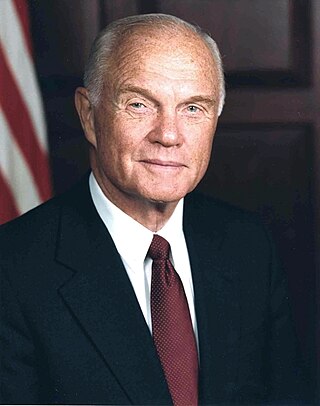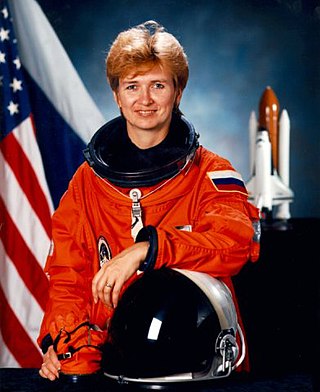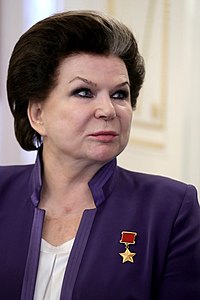
John Herschel Glenn Jr. was an American Marine Corps aviator, astronaut, businessman, and politician. He was the third American in space and the first American to orbit the Earth, circling it three times in 1962. Following his retirement from NASA, he served from 1974 to 1999 as a U.S. Senator from Ohio; in 1998, he flew into space again at the age of 77.

Joseph Jean-Pierre Marc Garneau is a retired Canadian Member of Parliament, retired Royal Canadian Navy officer and former astronaut who served as a Cabinet minister from 2015 to 2021. A member of the Liberal Party, Garneau was the minister of foreign affairs from January to October 2021 and minister of transport from November 2015 to January 2021. He was an MP in Westmount, Montreal for 15 years.

Robert Brent "Bob" Thirsk, is a Canadian retired engineer and physician, and a former Canadian Space Agency astronaut. He holds the Canadian record for the most time spent in space. He became an officer of the Order of Canada (OC) in 2013 and was named to the Order of British Columbia (OBC) in 2012.

STS-41-G was the 13th flight of NASA's Space Shuttle program and the sixth flight of Space Shuttle Challenger. Challenger launched on October 5, 1984, and conducted the second shuttle landing at Kennedy Space Center on October 13, 1984. It was the first shuttle mission to carry a crew of seven, including the first crew with two women, the first American Extravehicular activity (EVA) involving a woman (Sullivan), the first Australian-born person to journey into space as well as the first astronaut with a beard and the first Canadian astronaut.

Yelena Vladimirovna Kondakova is the third Soviet or Russian female cosmonaut to travel to space and the first woman to make a long-duration spaceflight. Her first trip into space was on Soyuz TM-20 on 4 October 1994. She returned to Earth on 22 March 1995, after a five-month stay at the Mir space station. Kondakova's second flight was as a mission specialist on the United States Space Shuttle Atlantis during mission STS-84 in May 1997. She was the last Russian woman in space until her successor cosmonaut Elena Serova flew to the International Space Station (ISS) on 25 September 2014.

STS-95 was a Space Shuttle mission launched from Kennedy Space Center, Florida on 29 October 1998, using the orbiter Discovery. It was the 25th flight of Discovery and the 92nd mission flown since the start of the Space Shuttle program in April 1981. It was a highly publicized mission due to former Project Mercury astronaut and United States Senator John H. Glenn Jr.'s return to space for his second space flight. At age 77, Glenn became the oldest person to go into space, a record that remained unbroken for 23 years until 82-year-old Wally Funk flew on a suborbital flight on Blue Origin NS-16, launching on 20 July 2021, which in turn was broken by William Shatner at age 90 on 13 October 2021 and then by Ed Dwight on May 19 2024. Glenn, however, remains the oldest person to reach Earth orbit. This mission is also noted for inaugurating ATSC HDTV broadcasting in the U.S., with live coast-to-coast coverage of the launch. In another first, Pedro Duque became the first Spaniard in space.

Mark Edward Kelly is an American politician, retired astronaut, and United States Navy captain. A member of the Democratic Party, he has been the junior U.S. senator from Arizona since 2020. In 2022, he won reelection to a full term.

Scott Joseph Kelly is an American engineer, retired astronaut, and naval aviator. A veteran of four space flights, Kelly commanded the International Space Station (ISS) on Expeditions 26, 44, 45, and 46.

Sergei Konstantinovich Krikalev is a Russian mechanical engineer and former cosmonaut and head of the Yuri Gagarin Cosmonaut Training Center.

Charles Joseph Precourt is a retired NASA astronaut. His career in flight began at an early age, and spans his entire lifetime. He served in the US Air Force, piloted numerous jet aircraft, and piloted and commanded the Space Shuttle. Notably, he piloted or commanded several missions which involved docking with the Russian Mir space station and was heavily involved in Russian/US Space relations as well as the International Space Station collaboration. He also served as Chief of the Astronaut Office from 1998 to 2002. He retired from the USAF with the rank of colonel.

The Shuttle–Mir program was a collaborative space program between Russia and the United States that involved American Space Shuttles visiting the Russian space station Mir, Russian cosmonauts flying on the Shuttle, and an American astronaut flying aboard a Soyuz spacecraft to allow American astronauts to engage in long-duration expeditions aboard Mir.

Marcos Cesar Pontes is a Brazilian Air Force pilot, engineer, AEB astronaut, politician and author. He became the first South American and the first Lusophone to go into space when he docked onto the International Space Station aboard Soyuz TMA-8 on 30 March 2006. He is the only Brazilian to have completed the NASA astronaut training program, although he switched to training in Russia after NASA's Space Shuttle program encountered problems. After Jair Bolsonaro's election as President of Brazil in 2018, Pontes was officially nominated to be Minister of Science, Technology and Innovation, a post which he accepted days later and assumed when Bolsonaro's government began. He left the post on 31 March 2022 and in the same year was elected federal senator for his state, São Paulo.

Leonid Kostyantynovych Kadeniuk was the first astronaut of independent Ukraine to fly into outer space.

A payload specialist (PS) was an individual selected and trained by commercial or research organizations for flights of a specific payload on a NASA Space Shuttle mission. People assigned as payload specialists included individuals selected by the research community, a company or consortium flying a commercial payload aboard the spacecraft, and non-NASA astronauts designated by international partners.

Benjamin Alvin Drew Jr. is a United States Air Force officer and a former NASA astronaut. He has been on two spaceflights; the first was the Space Shuttle mission STS-118 to the International Space Station, in August 2007. Drew's second spaceflight took place in March 2011 on STS-133, another mission to the International Space Station. STS-133 was Space Shuttle Discovery's final mission. Drew took part in two spacewalks while docked to the station. Drew was the final African-American to fly on board a Space Shuttle, as the final two Space Shuttle missions, STS-134 and STS-135, had no African-American crew members.
Astronauts hold a variety of ranks and positions. Each of these roles carries responsibilities that are essential to the operation of a spacecraft. A spacecraft's cockpit, filled with sophisticated equipment, requires skills differing from those used to manage the scientific equipment on board, and so on.
Astronauts and other spaceflight participants have observed their religions while in space; sometimes publicly, sometimes privately. Religious adherence in outer space poses unique challenges and opportunities for practitioners. Space travelers have reported profound changes in the way they view their faith related to the overview effect, while some secular groups have criticized the use of government spacecraft for religious activities by astronauts.

Women have flown and worked in outer space since almost the beginning of human spaceflight. A considerable number of women from a range of countries have worked in space, though overall women are still significantly less often chosen to go to space than men, and by June, 2020 constitute only 12% of all astronauts who have been to space. Yet, the proportion of women among space travelers is increasing substantially over time. The first woman to fly in space was Soviet Valentina Tereshkova, aboard the Vostok 6 space capsule on June 16–19, 1963. Tereshkova was a textile-factory assembly worker, rather than a pilot like the male cosmonauts flying at the time, chosen for propaganda value, her devotion to the Communist Party, and her years of experience in sport parachuting, which she used on landing after ejecting from her capsule. Women were not qualified as space pilots and workers co-equal to their male counterparts until 1982. By October 2021, most of the 70 women who have been to space have been United States citizens, with missions on the Space Shuttle and on the International Space Station. Other countries have flown one, two or three women in human spaceflight programs. Additionally one woman of dual Iranian-US citizenship has participated as a tourist on a US spaceflight.
















